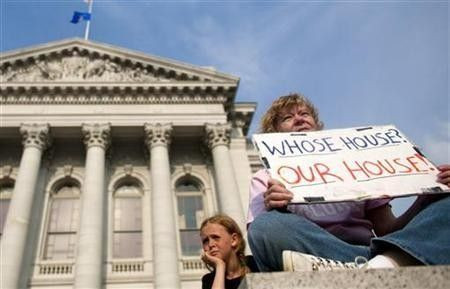Wisconsin Recall Elections: Why They Matter

Elections for state legislators rarely attract national attention, but a wave of Wisconsin recall elections beginning Tuesday will be closely watched as a gauge of the political climate and as a potential bellwether for 2012.
The elections, nine in total, serve as a referendum on the contentious vote earlier this year to sharply curtail collective bargaining rights for most public employees. Six of the recall elections target Republican state senators who voted for the bill; the other three, including the Tuesday recall election for Sen. Dave Hansen, take aim at Democratic senators who fled the statehouse in an ultimately unsuccessful effort to prevent a vote.
Less than two years ago Republicans took both houses of the Wisconsin legislature and the governor's office in a pattern that played out across the country as voters, dismayed by the economy and galvanized by the ascendant Tea Party movement, overwhelmingly elected Republicans. That was seen not only as a repudiation of Democratic policies but as an endorsment of the cost-cutting, deficit focused ideology espoused by Republican candidates.
In Wisconsin, the substance of that policy soon became clear. Freshly installed governor Scott Walker, emboldened by a Republican majority in the legislature, moved quickly and aggressively to roll back union benefits. He defended the move with the same reasoning that propelled many Republicans to power in 2010, arguing that he was taking on unsustainable costs in a time of enormous budget deficits. He succeeded, but the backlash was extreme.
Now, just as the 2010 elections were interpreted as a reaction to Democratic policies, the Wisconsin recall elections will offer clues about how voters feel about the Republican agenda. Republican governors in states from Ohio to New Jersey also sought to roll back union benefits, and while is not a strictly partisan issue -- Governor Andrew Cuomo of New York, a Democrat, recently wrung major wage and benefit concessions out of public unions -- it does pit the GOP's relentless focus on slicing spending against Democrats who believe such efforts are unnecessarily vilifying unions and harming workers.
Wisconsin is also one of a handful of states that could prove to be pivotal in the 2012 presidential race. Although Wisconsin has not fallen into the Republican column since 1984, Al Gore in 2000 and John Kerry in 2004 carried the state by razor-thin margins. The Republican National Committee has identified Wisconsin as one of 13 battleground states. Wisconsin's unemployment rate was 7.4 percent in May, compared to a national rate of 9.1 percent, and its manufacturing sector added jobs. Some of the benefits of that recovery would likely accrue to President Barack Obama in 2012, in a presidential election that will be largely determined by the condition state of the U.S. economy.
© Copyright IBTimes 2025. All rights reserved.





















